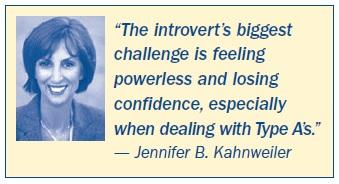The power of introverts
Jennifer B. Kahnweiler is an Atlanta-based author, speaker and executive coach who has been hailed as a “champion for introverts.” Her best-selling books The Introverted Leader: Building on Your Quiet Strength and Quiet Influence: The Introvert’s Guide to Making a Difference have achieved widespread appeal. We reached out to her to learn more about the power of introverts in the office.
 APT: What is the biggest misconception people have about introverts in the workplace?
APT: What is the biggest misconception people have about introverts in the workplace?
Kahnweiler: There are several big ones. Introverts may be viewed as unfeeling when they don’t show all their emotions on their face. They also can be perceived as unintelligent with little to contribute. Finally, people see them as slow thinkers when they take their time to respond. None of these are true, but can create negative impressions that last.
APT: What is the biggest challenge that introverts face in the workplace?
Kahnweiler: The introvert’s biggest challenge is feeling powerless and losing confidence, especially when dealing with Type A’s. By making small changes to manage perceptions, they can benefit themselves and their organizations. For instance, they can use their own low-key style and calm demeanor to effectively communicate insights and innovative ideas. I found that in research for “Quiet Influence,” successful introverts prepare for meetings in detail, slow down and talk to people face-to-face whenever possible, and use social media to their advantage by connecting with influencers within and outside the workplace.
APT: What advantages do introverts bring to the workplace?
Kahnweiler: Introverts bring many strengths to the table—strengths that include reflection, preparation, listening, focused dialogue, writing and—very important today—effective use of social media. Tim Cook, Apple’s former COO and now CEO, is a good example of an effective introvert—what I like to call quiet influencers. His thoughtful demeanor and low-key style were very different from his predecessor, and in his previous role as COO, it appeared that he provided a tempering, calm counterbalance to Jobs’ sometimes bombastic personality.
APT: What’s your favorite piece of advice for an introverted administrative assistant working in an office run by extroverts?
Kahnweiler: If you are an introvert, chances are you’ve tried to influence others by mirroring your more outgoing colleagues. My guess is that such an approach isn’t working for you—it’s exhausting, unsustainable and ultimately ineffective. The answer isn’t about becoming the extrovert you aren’t. I believe, however, that you will become a more effective influencer when you stop trying to act like an extrovert and instead make the most of your natural, quiet strengths. For instance, taking needed quiet time and having some focused conversations with your managers will strengthen communication. Who knows? Your calm demeanor and thoughtful reflection may even have rub off on them!




